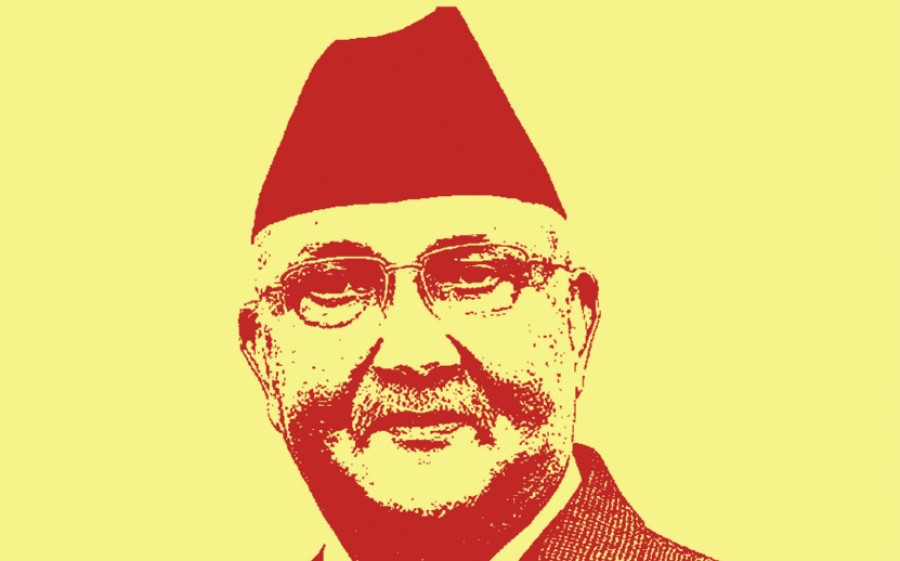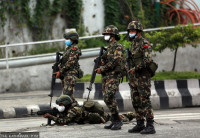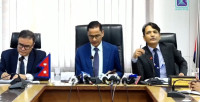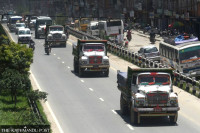National
In ordinance, Oli shows yet another authoritarian streak
By amending the Constitutional Council Act, the prime minister has effectively defenestrated the opposition leader and Speaker and disturbed the balance of power in a blatant attack on the spirit of the constitution, analysts say.
Tika R Pradhan
Prime Minister KP Sharma Oli on Tuesday bulldozed an ordinance to amend the Constitutional Council Act in what was described by many as a Machiavellian fraud on the constitution and an action that undermined the principle of checks and balances.
After Speaker Agni Sapkota refused to attend the meeting of the Constitutional Council called for Tuesday morning, Oli in the afternoon sent an ordinance on Constitutional Council Act (Function, Duties and Procedures) 2010 to the Office of the President, seeking amendments to at least two clauses. President Bidya Devi Bhandari swiftly promulgated the ordinance.
The amended provisions mean the Constitutional Council can convene a meeting if the majority of the existing members attend the meeting and take a decision on the basis of majority.
Oli then held the meeting of the Constitutional Council in the evening as per the amended rules.
Leaders from Oli’s Nepal Communist Party (NCP) and the main opposition Nepali Congress as well as analysts and experts on constitutional matters said that Oli made yet another attack on the system and the constitution by introducing the ordinance to amend the Constitutional Council Act.
“By introducing the ordinance, Oli has committed a fraud on the constitution and colorable exercise of power,” said Bhimarjun Acharya, an advocate with specialisation on constitutional matters.
“The new provisions that even the presence of just three members will be considered enough to convene the meeting and decisions can be taken based on majority disturb the basic scheme of the constitution.”
Article 284 of constitution stipulates a five-member Constitutional Council headed by the prime minister.
The chief justice, Speaker, deputy Speaker, National Assembly chair and the leader of the main opposition are the members of the Council.
Clause 6 (3) of the Constitutional Council Act (Functions, Duties and Procedures) 2010 had it that at least five members must be present besides the prime minister for the Council to convene its meeting. Similarly, Clause 6 (5) said that a decision must be taken based on consensus.
Since the deputy Speaker is yet to be elected, one member’s absence could stop the Council from holding the meeting.
Tuesday morning’s meeting could not take place because Speaker Sapkota refused to attend the meeting. Oli then changed the provisions in such a way that the Council can sit and take decisions in the presence of just three members. With the new provisions, Oli, who is also the chair of the ruling Nepal Communist Party, has effectively defenestrated not only the House Speaker but also the opposition leader.
“If keeping the deputy Speaker post vacant and not taking the Speaker into confidence and saying there was a lack of quorum is ludicrous, introducing an ordinance on the Constitutional Council bypassing the House session is an undemocratic move,” main opposition Nepali Congress President Sher Bahadur Deuba wrote on Twitter. “This has made [Oli’s] totalitarian attitude even more apparent."
Pushpa Kamal Dahal, the other chair of the Nepal Communist Party, has called Oli’s move of introducing the ordinance a mockery of democracy.
“This somehow disrespects and minimises Parliament,” Dahal told the BBC Nepali service. “This, I feel, is also an indication of inviting authoritarianism. The ordinance is wrong and it must be withdrawn.”
Oli’s ordinance move comes at a time when he has slid into the minority in his own party. Dahal, backed by senior leaders Madhav Kumar Nepal, Jhala Nath Khanal, Bamdev Gautam and Narayan Kaji Shrestha, has been putting a squeeze on Oli to step down either as prime minister or party chair.
According to insiders, Sapkota’s decision not to attend Tuesday's Constitutional Council meeting came as per directives from Dahal and Nepal. Sapkota, however, has tried to clarify why he could not attend the meeting.
Sapkota had informed the prime minister and Council chair about his inability to attend the meeting, saying there was a lack of preparation, homework, mutual consultation and necessary coordination for the meeting, Sapkota’s office said in a statement.
Insiders say Oli has for long seen Sapkota as an irritant and he took the Speaker’s refusal to attend the meetings on Tuesday as an offence.
Acharya, the constitutional law expert, said Speaker Sapkota failed to perform his constitutional duty by refusing to attend the Constitutional Council meeting.
“It is an objectionable act by the Speaker to not attend the Council meeting,” Acharya told the Post. “The Speaker is equally responsible for prompting the prime minister to issue the ordinance.”
But many say since Oli had earlier in April also tried to introduce a similar ordinance and that his government so far has introduced 10 ordinances, his action just shows how he has been undermining the parliamentary system and running the government through ordinance. Oli had then also issued another ordinance to amend the Political Parties Act with the provision that made splitting and registering a party easier. Both the ordinances were withdrawn after massive criticism.
Gagan Thapa, a Nepali Congress central member and former minister, said the recent developments stemming from the feud in the ruling party pose a threat to democratic system and constitutional principles.
“The composition of the Council was so envisioned that it ensured checks and balances. But the ordinance has trampled upon the very core concept,” said Thapa, who is known among a few opposition leaders who strongly raise their issues in Parliament. “Had the deputy Speaker been elected by resuming the House session, Oli would not have been able to bulldoze such an ordinance.”
As per constitutional provisions, the Speaker and deputy Speaker must be from different parties, and since Sapkota was elected from the ruling party quota, the deputy Speaker would have been from any other party, most probably the Nepali Congress or the Janata Samajbadi Party.
Thapa, however, conceded that his party’s failure to act as an effective opposition gave free rein to Oli.
The ordinance saga has also brought one more dangerous fact to the fore–that the two offices that should work above partisan interests have been heavily influenced by party politics, or factional politics for that matter.
President Bhandari has attracted opprobrium even in the past for showing excessive interest in ruling party politics and favouring the Oli camp.
Thapa said that the President has stooped too low by being complicit in Oli’s actions that are against the constitution and democratic system.
“She has become a member of the Oli’s faction within the ruling party,” Thapa told the Post.
Analysts say what is concerning is ever since Oli assumed office, he has been displaying authoritative streaks and he seems to have misconstrued the electoral mandate as the authority to rule with an iron fist.
Immediately after being elected, the Oli administration tried to curb civil liberty by imposing bans on protests at Maitighar. He then took some crucial agencies like the National Investigation Department, the Department of Revenue Investigation and the Department of Money Laundering Investigation under the Prime Minister’s Office.
His government then tried to introduce a series of bills aimed at curtailing media freedom and freedom of expression shrinking civic space. Oli has never concealed his contempt for the media, chiding journalists and reports that have tried his administration to account on multiple occasions.
Analysts say Tuesday’s ordinance is just yet another blow to democratic values.
“In his quest for authoritarianism, Oli has indulged in too many misadventures,” said Geja Sharma Wagle, a political commentator and a columnist for the Post’s sister paper Kantipur. “He is now trying to rule through ordinances. Today’s move seriously challenges democratic system, spirit of the constitution and established values.”
According to Wagle, the Constitutional Council has become a fresh victim of the intra-party conflict.
“The way things have unfolded has also dragged the Office of the President into controversy,” Wagle told the Post. “Both the President and the prime minister have weakened democracy and the constitution.”
According to Acharya, the constitutional expert, Oli’s ordinance move is now likely to embroil the judiciary into a fresh controversy.
Though the chief justice joined Tuesday’s Council later in the meeting, Acharya said time has come for him to make decisions cautiously when it comes to the Council.
“The chief justice also heads the Supreme Court, which is the final interpreter of the constitution,” said Acharya. “And the Oli government’s move of issuing the ordinance is likely to land in the Supreme Court and if that happens, the chief justice has to deal with it.”
Analysts say Prime Minister Oli and President Bhandari’s actions will have far-reaching implications, as in one single stroke, both have dragged the executive, judiciary and legislature into controversy. The ordinance, thus, has trampled upon the doctrine of separation of powers, one of the fundamental tenets of democracy.
Rajendra Maharjan, who writes extensively on contemporary political and social affairs, said while the prime minister has left no stone unturned to destroy the system, the President and the Speaker too have failed to play their roles as defined by the constitution.
“The Speaker’s role has certainly come into question, as he seems to have acted at the behest of some political leaders including Dahal. Instead of skipping the meeting, he should have attended and put forth his views,” said Maharjan, who is also a columnist for the Post’s sister paper Kantipur. “As far as the President is concerned, she has discredited the high office. People now have started commenting if the President has become personal secretary of the prime minister. This is a disgrace to the people.”
The ordinance has further polarised the ruling party.
Hours after the President promulgated the ordinance, leaders of the Dahal faction held an emergency meeting at Khumaltar and decided to strongly counter Oli’s move during Wednesday’s Standing Committee meeting.
“This ordinance is against democracy and the spirit of the constitution,” said senior leader Jhala Nath Khanal after the meeting. “We will force Oli to withdraw it.”
Leaders close to Oli, however, have been defending the move, saying that the ordinance was imperative as dozens of positions in the constitutional bodies are vacant.
“Prime minister was blamed for keeping the constitutional bodies vacant, but now when he is trying to fill the positions, everyone is opposing his move,” said Satya Narayan Mandal, a Standing Committee member close to Oli. “It’s been three years since the government was formed. The prime minister's only intention is to fill the vacant posts under the constitutional obligations.”
But issuing an ordinance by trampling upon the constitutional spirit to say that it was necessary to fill the vacant positions under the constitutional obligation is but paradoxical, according to some observers.
“The Constitutional Council has been envisioned by the constitution in such a way that it ensures balance of power as it has representation of the governing party, the judiciary, the Houses and the leader of the opposition,” said Shyam Shrestha, a political commentator who has followed Nepal’s leftist politics for decades. “Oli just destroyed the concept of checks and balances by issuing the ordinance.”




 9.44°C Kathmandu
9.44°C Kathmandu















